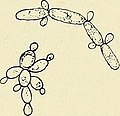Pichia
Pichia is a genus of yeast within the family Saccharomycetaceae. It is a significant genus in both industrial and scientific research contexts, known for its diverse roles ranging from fermentation agents to model organisms in genetic studies. Pichia species have been isolated from various environments, including soil, water, and plant surfaces, indicating their widespread presence and ecological versatility.
Characteristics[edit]
Pichia species are unicellular, eukaryotic microorganisms that reproduce asexually by budding or fission and, in some cases, can undergo sexual reproduction to form asci containing spores. They are characterized by their ability to metabolize a wide range of sugars and organic acids, a trait that is highly valued in biotechnological applications. The cell morphology of Pichia can vary but is typically oval to elongated in shape.
Taxonomy[edit]
The taxonomy of the Pichia genus has undergone significant revisions with advances in molecular biology techniques, particularly DNA sequencing. These methods have helped clarify the phylogenetic relationships within the Saccharomycetaceae family, leading to the reclassification of several species. As a result, the genus Pichia is now more accurately defined, with clear distinctions from closely related genera.
Biotechnological Applications[edit]
Pichia species, most notably Pichia pastoris, are widely used in biotechnology for the production of recombinant proteins. P. pastoris is a preferred host for gene expression due to its ability to perform post-translational modifications similar to those in higher eukaryotes, its rapid growth rate, and its capacity to reach high cell densities in fermenters. This yeast is employed in the production of various pharmaceuticals, enzymes, and vaccines.
Research Applications[edit]
In addition to their industrial applications, Pichia species serve as valuable model organisms in research. Their simple eukaryotic system allows for the study of fundamental biological processes, including gene regulation, protein secretion, and cellular metabolism. The genetic tractability of P. pastoris and other species facilitates the functional analysis of genes and pathways, contributing to our understanding of more complex eukaryotic systems.
Environmental and Clinical Significance[edit]
While Pichia species are generally not pathogenic, some have been associated with opportunistic infections in immunocompromised individuals. Their presence in various environments also makes them subjects of ecological and evolutionary studies, particularly in understanding the dynamics of microbial communities and their adaptation to different niches.
Conclusion[edit]
The genus Pichia represents a group of yeasts with significant implications for biotechnology, research, and ecology. Its members' versatility in sugar metabolism and genetic manipulability make them invaluable tools in industrial bioprocesses and scientific investigation. As research continues, the potential applications and understanding of Pichia species are likely to expand, further cementing their role in science and industry.

-
Pichia gentiana
Ad. Transform your life with W8MD's Budget GLP-1 injections from $75


W8MD offers a medical weight loss program to lose weight in Philadelphia. Our physician-supervised medical weight loss provides:
- Weight loss injections in NYC (generic and brand names):
- Zepbound / Mounjaro, Wegovy / Ozempic, Saxenda
- Most insurances accepted or discounted self-pay rates. We will obtain insurance prior authorizations if needed.
- Generic GLP1 weight loss injections from $75 for the starting dose.
- Also offer prescription weight loss medications including Phentermine, Qsymia, Diethylpropion, Contrave etc.
NYC weight loss doctor appointmentsNYC weight loss doctor appointments
Start your NYC weight loss journey today at our NYC medical weight loss and Philadelphia medical weight loss clinics.
- Call 718-946-5500 to lose weight in NYC or for medical weight loss in Philadelphia 215-676-2334.
- Tags:NYC medical weight loss, Philadelphia lose weight Zepbound NYC, Budget GLP1 weight loss injections, Wegovy Philadelphia, Wegovy NYC, Philadelphia medical weight loss, Brookly weight loss and Wegovy NYC
|
WikiMD's Wellness Encyclopedia |
| Let Food Be Thy Medicine Medicine Thy Food - Hippocrates |
Medical Disclaimer: WikiMD is not a substitute for professional medical advice. The information on WikiMD is provided as an information resource only, may be incorrect, outdated or misleading, and is not to be used or relied on for any diagnostic or treatment purposes. Please consult your health care provider before making any healthcare decisions or for guidance about a specific medical condition. WikiMD expressly disclaims responsibility, and shall have no liability, for any damages, loss, injury, or liability whatsoever suffered as a result of your reliance on the information contained in this site. By visiting this site you agree to the foregoing terms and conditions, which may from time to time be changed or supplemented by WikiMD. If you do not agree to the foregoing terms and conditions, you should not enter or use this site. See full disclaimer.
Credits:Most images are courtesy of Wikimedia commons, and templates, categories Wikipedia, licensed under CC BY SA or similar.
Translate this page: - East Asian
中文,
日本,
한국어,
South Asian
हिन्दी,
தமிழ்,
తెలుగు,
Urdu,
ಕನ್ನಡ,
Southeast Asian
Indonesian,
Vietnamese,
Thai,
မြန်မာဘာသာ,
বাংলা
European
español,
Deutsch,
français,
Greek,
português do Brasil,
polski,
română,
русский,
Nederlands,
norsk,
svenska,
suomi,
Italian
Middle Eastern & African
عربى,
Turkish,
Persian,
Hebrew,
Afrikaans,
isiZulu,
Kiswahili,
Other
Bulgarian,
Hungarian,
Czech,
Swedish,
മലയാളം,
मराठी,
ਪੰਜਾਬੀ,
ગુજરાતી,
Portuguese,
Ukrainian
